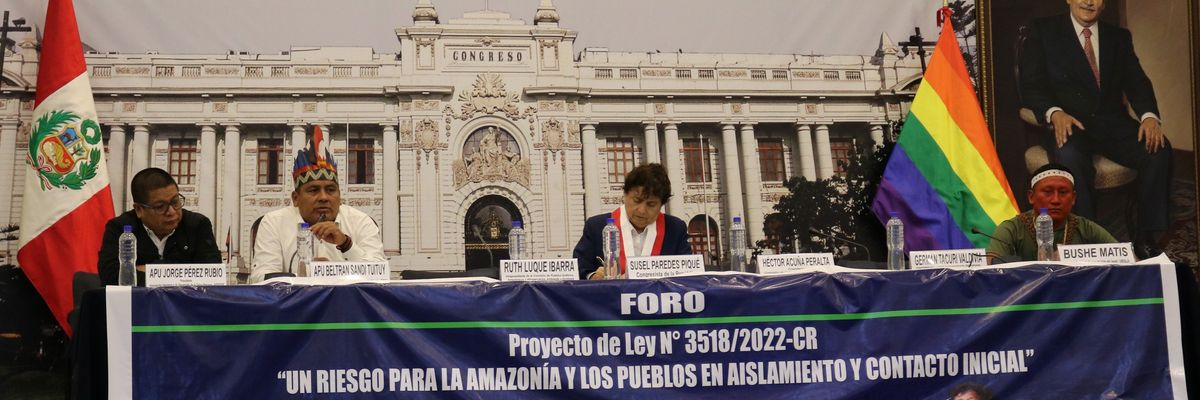A delegation of Indigenous leaders from Brazil is in Peru this week to join forces with their counterparts there who are fighting to stop proposed legislation many critics call the "genocide bill" due to fears its passage could result in uncontacted tribes being wiped out by fossil fuel companies and other rapacious resource extractors.
Members of the Union of Indigenous Peoples of the Javari Valley (UNIVAJA), a coalition of tribes from the Amazon region, joined the Interethnic Association for the Development of the Peruvian Rainforest (AIDESEP) and the Regional Organization of Eastern Indigenous Peoples (ORPIO) on Tuesday during a joint session of Peru's Congress ahead of a Wednesday meeting of a congressional decentralization committee debating 3518/2022-CR, a bill that would modify a law protecting uncontatced tribes.
"For the Indigenous, there are no borders. This is an invention of the states," UNIVAJA coordinator Bushe Matis said at the Peruvian Congress on Tuesday. "If the project were approved, it is very dangerous, as happened with my people, the Matsés, who were contacted in 1976 and caught the flu, which killed many people."
Speaking at the same press conference, AIDESEP president Jorge Pérez said that "just as there are beneficial laws, there are also laws that can harm. In our opinion, this bill is negative."
The proposed legislation was introduced by Peruvian Congressman Jorge Morante Figari, a member of the far-right Popular Force party run by Keiko Fujimori, daughter of former dictator Alberto Fujimori. Right-wing lawmakers are trying to push the bill through amid the deadly political chaos that followed the December 2022 ouster of former leftist leader Pedro Castillo and what opponents call a political coup by unelected U.S.-backed President Dina Boluarte.
Critics say that the 25 uncontacted and recently contacted Indigenous peoples in Peru who have been officially recognized could lose that recognition if the bill is passed, that reserves established for these people could be revoked with no prospect for the allocation of new reserves, and that Indigenous lands will be subject to further exploitation by fossil fuel, logging, and mining companies.
Peru's Ministry of Culture says 3518/2022-CR "represents a danger to the protection of the life and territory of the Indigenous peoples."
The proposal has sparked worldwide alarm, with the British, Canadian, and German ambassadors to Peru signing a joint letter urging the decentralization committee to shelve the legislation. More than 10,000 people have also signed a petition against the bill.
Teresa Mayo of the London-based Indigenous rights group Survival International—which calls 3518/2022-CR "a naked land grab by the oil and gas industry"—said Tuesday that "the genocide bill is the most serious attack on Peru's uncontacted tribes in decades."
"All the rights and protections that Peru's Indigenous people and their allies have fought so hard for, over many years, are now at risk of being extinguished with a stroke of the pen," Mayo continued.
"These rights are under attack in Brazil too, which is why Indigenous people have joined hands across the Peru-Brazil border to fight these genocidal plans," she added. "It's a moment of desperate danger—the very survival of dozens of uncontacted tribes is now at risk."
While Luiz Inácio Lula de Silva, Brazil's leftist president, has centered Indigenous rights during his five-month administration, the Brazilian Congress—which is controlled by right-wing lawmakers—last month voted to limit the power of a pair of ministries tasked with protecting Indigenous peoples and the environment.
Survival International reported earlier this year that 3518/2022-CR was drafted by Peruvian legislators with ties to fossil fuel corporations, including Perenco, an Anglo-French oil company operating inside uncontacted tribes' lands. Perenco and other companies, as well as right-wing Peruvian lawmakers, are trying to block finalization of the Napo-Tigre Indigenous Reserve, which would protect five isolated communities from intrusion and exploitation of lands and resources by extractive interests.

